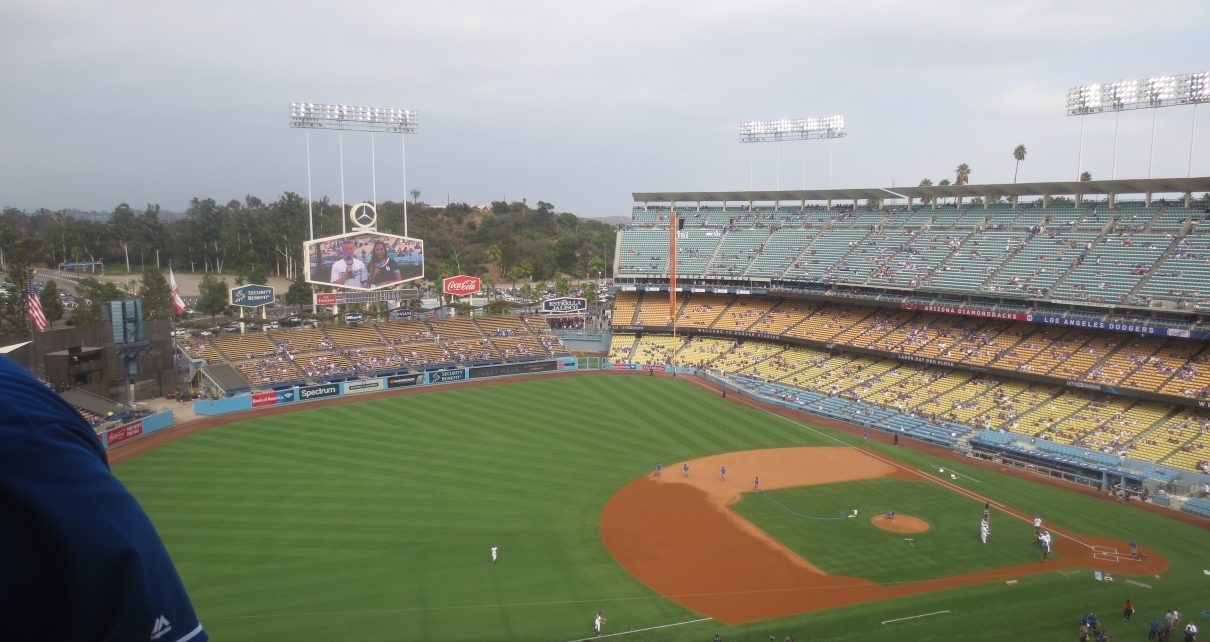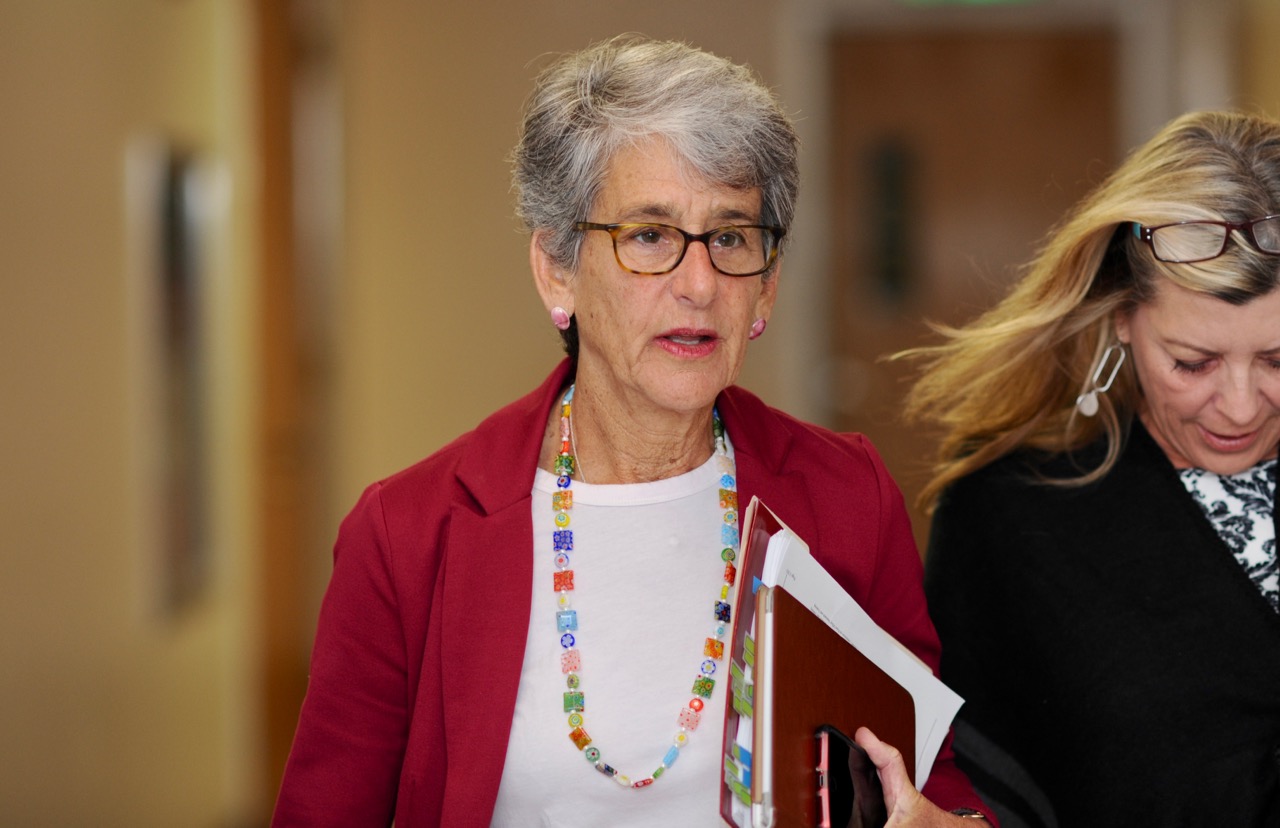
Dodger Stadium in Los Angeles (Photo: Evan Symon for California Globe)
Bill to Consider Reparations For Residents Displaced By Dodger Stadium Construction Unveiled In Assembly
This is what is so ridiculous – all Chavez Ravine families were compensated
By Evan Symon, March 27, 2024 11:34 am
A new bill to force the city of Los Angeles to create a task force on how to compensate residents for the loss of land and homes in the Chavez Ravine area of L.A. during the 1950s to build Dodger Stadium was formally introduced recently in the Assembly.
Leading up to the 1950’s, the L.A. neighborhoods of Palo Verde, La Loma, and Bishop were regarded widely as slums and some of the worst parts of the city. While the residents, predominantly Mexican-American, thought otherwise, the National Housing Act of 1949 helped allow cities to begin to revitalize areas deemed the worst in a city. The Chavez Ravine area was then scouted and deemed the best place for public housing. Eminent domain was soon established, and throughout the 1950s, residents took payments and left, beyond a few holdouts. While the holdouts delayed the project, a new pressing need for a stadium was found when the Brooklyn Dodger moves to L.A. in 1958.
Chavez Ravine was subsequently chosen for the stadium site. Remaining residents didn’t like the switchover from public housing to a stadium, and began protests. However, L.A. County Sheriffs began removing the stragglers. While public sympathy was initially on their side, they quickly came out against them when it was found that the remaining people were mostly landowners who owned multiple homes. One, the Arechiga family, owned multiple properties across Los Angeles, and eventually accepted the city’s cash offer. Construction happened soon afterwards.
By 1962, Dodger Stadium was built. While the situation has been widely seen as a matter of eminent domain and all residents being paid to leave, the idea of reparations for the removed families began to creep in during recent decades. This led to Assembly Bill 1950 this month.
According to AB 1950, authored by Assemblywoman Wendy Carrillo (D-Boyle Heights), the City of Los Angeles would be required to create a task force for the purpose of providing compensation to former residents and landowners displaced from the Chavez Ravine area of Los Angeles from the 1950’s, as well as their lineal descendants. A task force of nine people would also be set up and would oversee the city’s administration process pursuant to these provisions and to create specified reports addressing various matters related to compensation for former residents and landowners of Chavez Ravine and their descendants.
AB 1950 would also require the City of Los Angeles to decide on one of several forms of compensation, including conveying city-owned real property for housing, use, and enjoyment equal to the square footage area of land acquired by the city from the property owners or monetary compensation for the taking of the former landowners’ private property equal to the fair market value at the time of sale or taking, adjusted for inflation. The bill, also known as the Chavez Ravine Accountability Act, would provide that the compensation would be exempt from taxation and the real property tax. In addition, the city would also have to construct a permanent memorial in recognition of the displaced residents and landowners of the Chavez Ravine community.
AB 1950 and Chavez Ravine
Assemblywoman Carrillo wrote the bill because of the communities being displaced under “unfair” circumstances, not getting adequate compensation at the time.

“AB 1950, the Chavez Ravine Accountability Act aims to correct an injustice that displaced families and has lingered in the shadows of Los Angeles Eastside history for far too long,” said Assemblywoman Carrillo last week in a statement. “Amid the 1950s, the vibrant community of Chavez Ravine, home to mostly Mexican-American families, as well as Italian-American and Chinese-American, saw an upheaval as families were uprooted and displaced in the name of progress. Families were promised a return to better housing, but instead, they were left destitute. For generations, Chavez Ravine stood as a beacon of hope and resilience, embodying the dreams and aspirations of families who built their lives within its embrace. With this legislation, we are addressing the past, giving voice to this injustice, acknowledging the pain of those displaced, offering reparative measures, and ensuring that we honor and remember the legacy of the Chavez Ravine community.”
Insurance Commissioner Ricardo Lara, a sponsor of the bill, added, “AB 1950 is about confronting a historical injustice and ensuring Angelenos understand the true story of Chavez Ravine. Only by acknowledging the past can we work towards a more just and equitable future for all communities in Los Angeles.”
At a news conference on Friday, descendants of the Arechiga family, the multiple home owning family who was the last to leave, added, “Today marks the start of the journey to correct the injustices that were done to the people of Palo Verde, La Loma and Bishop. We must hold all city, state and federal agencies accountable for their part in the destruction of the three communities — plus stealing all the future generations from their wealth as owners and renters. The stories of the three communities can never be told without us.”
Major issues with AB 1950
However, despite the early hype for the bill, legal experts noted that any type of reparations was unlikely, because of the legal circumstances surrounding the Chavez Ravine removals.
“Ok, they all sound confident, but this is highly unlikely to get anywhere outside of a few minor things,” explained San Diego real estate attorney Louis Keller to the Globe on Wednesday. “Let’s break this down. AB 1950 has some big and small asks, many of which will probably be numbed down by amendments. The memorial? Yeah, that would probably be ok with most. A report on what happened? The Reparations Task Force for slavery reparations okayed that. But flat out reparations? Highly unlikely. The 14 reparations bills that came off the slavery task force don’t have any cash or land options, with many of them actually being unpopular.”
“There was the Bruce’s Beach giveback a few years ago, but that was a very specific case where the family wasn’t compensated. All of the Chavez Ravine families were. This is what is so ridiculous. Yes, eminent domain and switching from public housing to a stadium weren’t exactly great for the residents there, but they all took the money. And now this bill is asking for real estate compensation or additional money? Any competent lawyer can argue these away. If this bill does manage to pass with that language in there, there is going to be a huge legal fight. Some of the things they want but didn’t offer in the 1950’s, like employment support, that might be doable. But these families had eminent domain executed against them, took the money, with the land going to a great public good, in this case, Dodger Stadium.”
“AB 1950 will have to pass both houses intact, which after what we saw with the last task force and issues over money, is likely not going to happen. California and L.A. are both tight on money right now, and reparations like they are trying to pull in the bill would hurt them. But even if that does pass, Newsom would have to sign the bill, which seems iffy. And if that gets passed, L.A. would then need to do something about it. And it would need to be passed and approved all of it without any interruptions or legal challenges. There is no way.”
“The fact is is that eminent domain usage was justified, the families took the money, and the area improved greatly. Is it disheartening to see entire neighborhoods have to go and people being forced off at the end? Yes, yes it is. But legally, there is no basis, and anything they pass with any kind of monetary reparations will be challenged immediately. This bill was not thought out very well, unless it’s purpose is to raise awareness on what happened there.”
AB 1950 is expected to be heard soon in the Assembly








At this point, everything is reparations-worthy. Basically, if you have ever lived or spent time in CA, you owe someone else money for your very existence. You being alive was at the expense of someone else – pay up!! What a clown show
While this is a great comment accurately describing the prevailing mentality of CA, it triggered me on a deep psychological and physical level.
As such, I am petitioning my Assembly member to issue financial reparations to anyone who read your comment.
Thanks
Love how Ms. DUI herself, Wendy Carrillo, who was so hammered she slammed into at least two cars parked on the street in the wee hours of the morning and then told police officers called to the scene that she lost control of her car because she “sneezed,” is behind this ridiculous 70+ years-old nonsense. Needing to buy votes, Wendy, for whatever the next office is you have your eye on now? You didn’t make “top-two” in the L.A. City Council race, so that’s out.
Then there is Insurance Commissioner Ricardo Lara, a “sponsor” of the bill, weighing in on this with the boilerplate leftist-flavored B.S. Californians constantly hear form these Dem/Marxists. Gee, it sure would be nice if Insurance Commissioner Lara would agree to even ONE interview with ANY California news outlet, to answer questions and maybe even offer help about our current INSURANCE CRISIS, wouldn’t it? But no, Lara has refused all interviews about this extremely critical matter. He won’t talk to anyone, won’t answer any questions. He’s too busy with this pointless crap.
Good luck with your vote-buying efforts, Carrillo and Lara! Disgusting.